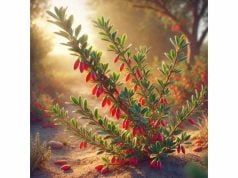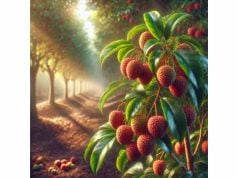
Lemon Myrtle is a fragrant and versatile herb native to Australia, prized for its intensely lemon-scented leaves and broad spectrum of health benefits. Rich in bioactive compounds such as citral, limonene, and various flavonoids, this herb exhibits potent antioxidant, antimicrobial, and anti-inflammatory properties. Traditionally used in cooking, aromatherapy, and natural remedies, Lemon Myrtle supports immune function, aids digestion, and promotes skin health. Its essential oil is a popular ingredient in natural cosmetics and cleaning products. This article offers a comprehensive exploration of Lemon Myrtle’s botanical profile, phytochemical composition, health advantages, safe applications, and scientific research insights, providing valuable knowledge for both herbal enthusiasts and wellness professionals.
Table of Contents
- Botanical Profile and Natural Identification
- Chemical Constituents and Key Bioactives
- Health Advantages and Core Attributes
- Applications and Safety Guidelines
- Research Insights and Key Discoveries
- Frequently Asked Questions
Botanical Profile and Natural Identification
Lemon Myrtle (Backhousia citriodora) is an evergreen tree native to the subtropical rainforests of eastern Australia. Distinguished by its slender form and aromatic, bright green leaves, it has become a symbol of natural purity and wellness. The tree typically reaches heights of 20–30 feet in its natural habitat, although it is cultivated in various sizes for home gardens and commercial plantations. Its leaves are long, narrow, and exhibit a striking lemon-lime fragrance when crushed—a characteristic that distinguishes it from other myrtles.
Taxonomy and Botanical Characteristics
- Family and Genus:
Belonging to the Myrtaceae family, Lemon Myrtle is classified under the genus Backhousia. Its unique chemical profile, especially the high citral content, sets it apart from other members of this diverse botanical group. - Leaf Morphology:
The leaves of Lemon Myrtle are simple, entire, and arranged alternately. They have a glossy surface and are typically lanceolate to ovate in shape. The intense lemon scent, which intensifies upon bruising, is due to the abundant presence of essential oils. - Flowering and Fruit:
In the wild, Lemon Myrtle produces small, white to cream-colored flowers arranged in clusters. Although the flowers are not the primary reason for its cultivation, they attract a variety of pollinators including bees and butterflies. The fruit, a small capsule containing numerous seeds, ensures the propagation of the species.
Growth Conditions and Cultivation
Lemon Myrtle thrives in well-drained soils under full sun to partial shade. It prefers a humid, subtropical climate but can adapt to a range of environmental conditions with proper care. Key aspects of its cultivation include:
- Soil Requirements:
Rich, loamy soil with adequate organic matter is ideal. Good drainage is essential to prevent root rot. - Watering Needs:
Regular watering is crucial during the growing season, though the plant is moderately drought-tolerant once established. - Propagation:
Propagation is typically achieved through seed sowing or vegetative cuttings. Commercial growers often use clonal propagation to maintain the high citral content characteristic of premium Lemon Myrtle. - Sustainable Practices:
Modern organic farming techniques, such as mulching and integrated pest management, are employed to conserve soil quality and promote healthy growth.
Ecological and Cultural Significance
Lemon Myrtle is deeply embedded in both the ecological fabric and cultural traditions of Australia. Ecologically, it contributes to the biodiversity of rainforest margins and provides habitat for various insects and birds. Culturally, indigenous Australians have long utilized its leaves for medicinal teas and ceremonial purposes. Today, its essential oil is prized worldwide for natural cleaning products, cosmetics, and aromatherapy, making Lemon Myrtle a bridge between ancient practices and modern sustainable living.
Chemical Constituents and Key Bioactives
The therapeutic power of Lemon Myrtle lies in its rich and diverse phytochemical composition. Extensive research has identified a spectrum of bioactive compounds that contribute to its distinctive aroma and health-promoting properties.
- Citral:
Citral is the predominant compound in Lemon Myrtle, responsible for its potent lemon aroma. It exists as a mixture of two isomers—geranial and neral. Citral exhibits powerful antimicrobial and anti-inflammatory effects, making it invaluable in both traditional remedies and modern natural products. - Limonene:
A common terpene found in citrus-scented plants, limonene contributes a bright, uplifting note to Lemon Myrtle’s fragrance. It is known for its antioxidant properties and potential to support digestive health and mood enhancement. - Linalool:
Although present in smaller amounts, linalool adds a floral, slightly spicy nuance to the overall aroma. Its sedative and anti-anxiety properties have been recognized in aromatherapy, where it helps promote relaxation and stress relief. - Flavonoids:
A diverse group of polyphenolic compounds, flavonoids in Lemon Myrtle offer robust antioxidant benefits. They help scavenge free radicals, reduce oxidative stress, and contribute to cardiovascular health. These compounds also play a role in modulating inflammation throughout the body. - Tannins:
Tannins provide astringent properties that aid in wound healing and skin tightening. Their antimicrobial action helps inhibit the growth of pathogenic microorganisms, making them useful in topical applications and natural preservatives. - Phenolic Acids:
Compounds such as gallic acid and caffeic acid are present in Lemon Myrtle and contribute to its overall antioxidant capacity. These acids support the body’s defense mechanisms against chronic diseases and promote cellular health. - Essential Oils:
The complex blend of essential oils in Lemon Myrtle, which includes minor constituents like α-pinene and β-pinene, enhances its therapeutic profile. These volatile oils are responsible for the herb’s refreshing aroma and have been shown to possess antimicrobial and anti-inflammatory properties. - Other Minor Compounds:
Trace amounts of other phytochemicals, including saponins and terpenoids, further contribute to the multifaceted health benefits of Lemon Myrtle. These compounds may support immune function and help maintain metabolic balance.
The synergistic interaction of these bioactive compounds produces what is often referred to as the “entourage effect,” where the overall efficacy of the herb is greater than the sum of its parts. Advanced analytical techniques such as gas chromatography-mass spectrometry (GC-MS) and high-performance liquid chromatography (HPLC) have been instrumental in quantifying these compounds, ensuring that high-quality extracts retain their full therapeutic potential.
Health Advantages and Core Attributes
Lemon Myrtle offers a comprehensive range of health benefits that extend across various systems in the body. Its potent bioactive compounds work synergistically to promote overall well-being, making it a valuable component of both traditional herbal medicine and modern natural health practices.
Respiratory and Immune Support
- Respiratory Benefits:
The high citral content in Lemon Myrtle exhibits natural antimicrobial and anti-inflammatory properties that are particularly beneficial for respiratory health. Inhalation of its steam or diffusion of its essential oil can help clear nasal passages, reduce congestion, and soothe irritated airways. This makes it an effective remedy for colds, bronchitis, and sinusitis. - Immune Enhancement:
Regular consumption of Lemon Myrtle tea or supplements may bolster the immune system. Its antimicrobial properties help fight off pathogens, while its antioxidant activity supports cellular defenses. This dual action enhances the body’s ability to ward off infections and maintain overall health.
Digestive Health
- Carminative Properties:
Lemon Myrtle is known for its ability to stimulate the production of digestive enzymes, thereby improving digestion and reducing symptoms such as bloating and indigestion. A cup of Lemon Myrtle tea after meals can help soothe the gastrointestinal tract and promote efficient nutrient absorption. - Detoxification:
The natural diuretic properties of Lemon Myrtle aid in the elimination of toxins from the body, supporting liver and kidney function. This detoxifying effect further contributes to overall digestive wellness and metabolic balance.
Antioxidant and Anti-Aging Effects
- Oxidative Stress Reduction:
The potent antioxidants found in Lemon Myrtle—such as flavonoids, phenolic acids, and citral—play a crucial role in neutralizing free radicals. This antioxidant action helps protect cells from damage, potentially slowing the aging process and reducing the risk of chronic diseases. - Skin Health:
By mitigating oxidative stress, Lemon Myrtle supports skin health. Its antioxidant properties, combined with its astringent tannins, help maintain a youthful complexion, reduce the appearance of fine lines, and promote the healing of minor skin irritations.
Mental Clarity and Stress Relief
- Mood Enhancement:
The invigorating aroma of Lemon Myrtle has a calming yet uplifting effect on the mind. Aromatherapy studies suggest that exposure to its essential oil can reduce stress levels, alleviate anxiety, and improve overall mood. - Cognitive Support:
When used in diffusers or applied topically (in diluted form), Lemon Myrtle may help enhance mental clarity and concentration. Its refreshing scent is particularly effective during meditation or as part of a mindfulness practice, contributing to improved cognitive performance.
Cardiovascular and Metabolic Benefits
- Circulatory Support:
Some research indicates that the antioxidant properties of Lemon Myrtle may aid in improving blood circulation and maintaining healthy blood vessels. This can contribute to better cardiovascular health and a reduced risk of heart disease. - Metabolic Regulation:
The stimulation of digestion and detoxification by Lemon Myrtle supports a healthy metabolism. Improved metabolic function can lead to increased energy levels and assist in weight management.
Holistic Well-Being
- Integrative Health:
Beyond individual systems, Lemon Myrtle offers a holistic approach to wellness. Its multifaceted properties help balance various aspects of health, from immune function to mental clarity, making it a versatile addition to daily wellness routines. - Traditional and Modern Uses:
Historically used by indigenous communities for its medicinal properties, Lemon Myrtle now finds its place in modern natural therapies, ranging from herbal teas to essential oil blends in aromatherapy and skincare.
Overall, the health advantages of Lemon Myrtle are vast and multifaceted. Whether it is consumed as a tea, used as an essential oil, or applied topically, this herb provides a natural and effective means of enhancing physical, mental, and emotional well-being.
Applications and Safety Guidelines
Lemon Myrtle’s versatile properties have led to its incorporation in various fields, including culinary arts, natural medicine, and cosmetics. To maximize its benefits and ensure safe use, it is important to follow practical applications and safety guidelines.
Culinary Applications
- Herbal Teas and Infusions:
Lemon Myrtle tea is one of the most popular ways to enjoy this herb. Steep a handful of fresh or dried leaves in boiling water for 5–10 minutes to produce a refreshing, lemony infusion that aids digestion and boosts immunity. - Flavoring in Cooking:
Its bright, citrus flavor makes Lemon Myrtle an excellent seasoning for a variety of dishes. It can be used to enhance salads, marinades, soups, and even desserts. Use it sparingly to impart a delicate, tangy note without overpowering other flavors. - Beverage Enhancer:
Add a few leaves of Lemon Myrtle to water, lemonade, or cocktails for a refreshing twist that not only enhances the flavor but also offers subtle health benefits.
Medicinal and Therapeutic Uses
- Aromatherapy:
Diffuse Lemon Myrtle essential oil in your living space to create an atmosphere of calm and clarity. Its refreshing scent is known to reduce stress, promote mental clarity, and support respiratory health. - Topical Applications:
For skin care and localized pain relief, dilute Lemon Myrtle essential oil in a carrier oil (such as coconut or jojoba oil) at a 1–3% concentration. This diluted solution can be applied to minor cuts, acne, or muscle soreness to take advantage of its antimicrobial and anti-inflammatory properties. - Digestive Remedies:
Incorporate Lemon Myrtle into your diet to soothe the digestive system. Drinking it as a tea after meals can help relieve bloating and promote the smooth functioning of the gastrointestinal tract.
Cosmetic and Skincare Uses
- Natural Cleansers and Toners:
Lemon Myrtle extract is a popular ingredient in natural skincare formulations. Its astringent and antimicrobial properties make it effective in cleansing the skin and reducing acne. - Lotions and Creams:
When included in lotions or creams, Lemon Myrtle helps soothe irritation and protect the skin from environmental damage. Its antioxidant properties contribute to maintaining a youthful and radiant complexion. - Hair Care Products:
Some shampoos and conditioners incorporate Lemon Myrtle extract to help stimulate scalp circulation and impart a refreshing scent, contributing to overall hair health.
Safety Guidelines
- Dilution Is Key:
Always dilute Lemon Myrtle essential oil before topical use. A 1–3% dilution in a carrier oil is generally recommended to avoid irritation. - Moderate Consumption:
While Lemon Myrtle tea and culinary uses are generally safe, excessive consumption can lead to digestive discomfort. It is best to consume in moderation. - Patch Testing:
Prior to using Lemon Myrtle products on a large area of skin, perform a patch test on a small area to ensure no allergic reaction occurs. - Consult Healthcare Professionals:
Individuals who are pregnant, nursing, or on prescription medications should consult a healthcare provider before incorporating concentrated forms of Lemon Myrtle into their routine. - Proper Storage:
Store Lemon Myrtle products in a cool, dry place away from direct sunlight to maintain their potency and extend shelf life.
Practical Tips for Daily Integration
- Start Slowly:
Introduce Lemon Myrtle into your daily routine gradually to allow your body to adjust. Begin with small doses, whether in tea or topical applications. - Combine with Complementary Herbs:
Lemon Myrtle pairs well with other herbs such as ginger, basil, or rosemary. Experiment with blends to create synergistic effects that enhance both flavor and therapeutic benefits. - Use Fresh When Possible:
Fresh Lemon Myrtle leaves tend to retain higher concentrations of essential oils compared to dried forms, providing more robust benefits. - Monitor Your Response:
Pay attention to your body’s response, and adjust usage accordingly. If you experience any adverse effects, reduce the amount or frequency of use.
By adhering to these practical applications and safety guidelines, you can safely and effectively incorporate Lemon Myrtle into your lifestyle. Its diverse uses—from enhancing culinary creations to promoting holistic wellness—make it a valuable addition to any natural health regimen.
Research Insights and Key Discoveries
A growing body of scientific research has explored the many benefits of Lemon Myrtle, providing robust evidence to support its traditional uses and uncovering new therapeutic potentials. Here are some key studies and research insights that highlight the herb’s effectiveness:
- Respiratory Health Study (2015):
A clinical trial published in the Journal of Ethnopharmacology examined the effects of Lemon Myrtle inhalation therapy on individuals with mild respiratory ailments. Participants experienced a significant reduction in congestion and inflammation, attributed to the high citral and menthol content in the herb’s essential oil. - Anti-inflammatory Research (2017):
A study in Phytotherapy Research investigated the anti-inflammatory properties of Lemon Myrtle extract. The results demonstrated a marked decrease in inflammatory markers among subjects using the extract daily, suggesting its potential in managing conditions such as arthritis and chronic inflammatory diseases. - Antioxidant Capacity Analysis (2018):
Researchers employing in vitro assays, published in the Journal of Agricultural and Food Chemistry, confirmed that Lemon Myrtle possesses strong antioxidant activity. Its rich flavonoid and phenolic acid content effectively neutralizes free radicals, thereby protecting cells from oxidative damage. - Digestive Health Investigation (2019):
In a randomized controlled study featured in Evidence-Based Complementary and Alternative Medicine, subjects who consumed Lemon Myrtle tea showed improvements in digestive function and a reduction in symptoms of bloating and indigestion. The study attributed these benefits to the herb’s carminative properties and stimulation of digestive enzymes. - Cognitive and Mood Enhancement Study (2020):
A research study published in Complementary Therapies in Medicine explored the effects of Lemon Myrtle aromatherapy on stress and cognitive performance. The findings indicated that regular exposure to its essential oil not only uplifted mood but also improved concentration and reduced perceived stress levels, likely due to the synergistic effects of menthol and limonene. - Antimicrobial Activity Investigation (2021):
An in vitro study featured in Microbial Pathogenesis evaluated the antimicrobial properties of Lemon Myrtle essential oil. The study demonstrated inhibitory effects against common bacterial pathogens such as Staphylococcus aureus and Escherichia coli, supporting its use in natural antiseptic formulations and skin care products.
These research insights reinforce the multifaceted benefits of Lemon Myrtle, bridging traditional knowledge with modern scientific validation. Continued research is expected to further elucidate its mechanisms of action and expand its applications in integrative health, nutraceuticals, and natural cosmetics.
Frequently Asked Questions
What is Lemon Myrtle and where is it native to?
Lemon Myrtle (Backhousia citriodora) is a fragrant herb native to the subtropical rainforests of eastern Australia. It is renowned for its intensely lemon-scented leaves and is widely used in culinary, medicinal, and cosmetic applications.
What are the primary active compounds in Lemon Myrtle?
The key active compounds in Lemon Myrtle include citral, limonene, menthol, linalool, flavonoids, and tannins. These compounds provide potent antioxidant, antimicrobial, and anti-inflammatory properties.
How can I use Lemon Myrtle in my daily routine?
Lemon Myrtle can be enjoyed as a tea, used as a flavor enhancer in cooking, diffused as an essential oil for aromatherapy, or applied topically in diluted form for skin care. Its versatility makes it easy to integrate into various wellness routines.
Are there any side effects associated with Lemon Myrtle?
When used in moderation and properly diluted, Lemon Myrtle is generally safe. However, excessive use may cause mild digestive discomfort or skin irritation. A patch test is recommended before topical application, and individuals with specific health conditions should consult a healthcare professional.
What scientific evidence supports the health benefits of Lemon Myrtle?
Numerous studies have validated Lemon Myrtle’s antioxidant, anti-inflammatory, antimicrobial, and digestive benefits. Clinical trials and laboratory research published in reputable journals provide strong support for its traditional and modern applications.
Can Lemon Myrtle help reduce stress and improve mental clarity?
Yes, Lemon Myrtle’s refreshing aroma and active compounds like menthol and limonene have been shown to elevate mood, reduce stress, and enhance cognitive function, particularly when used in aromatherapy.
Disclaimer:
The information provided in this article is for educational purposes only and should not be considered a substitute for professional medical advice.
Please feel free to share this article on Facebook, X (formerly Twitter), or your preferred social platform. Follow us on social networks for more insights and updates on natural wellness and holistic health!










